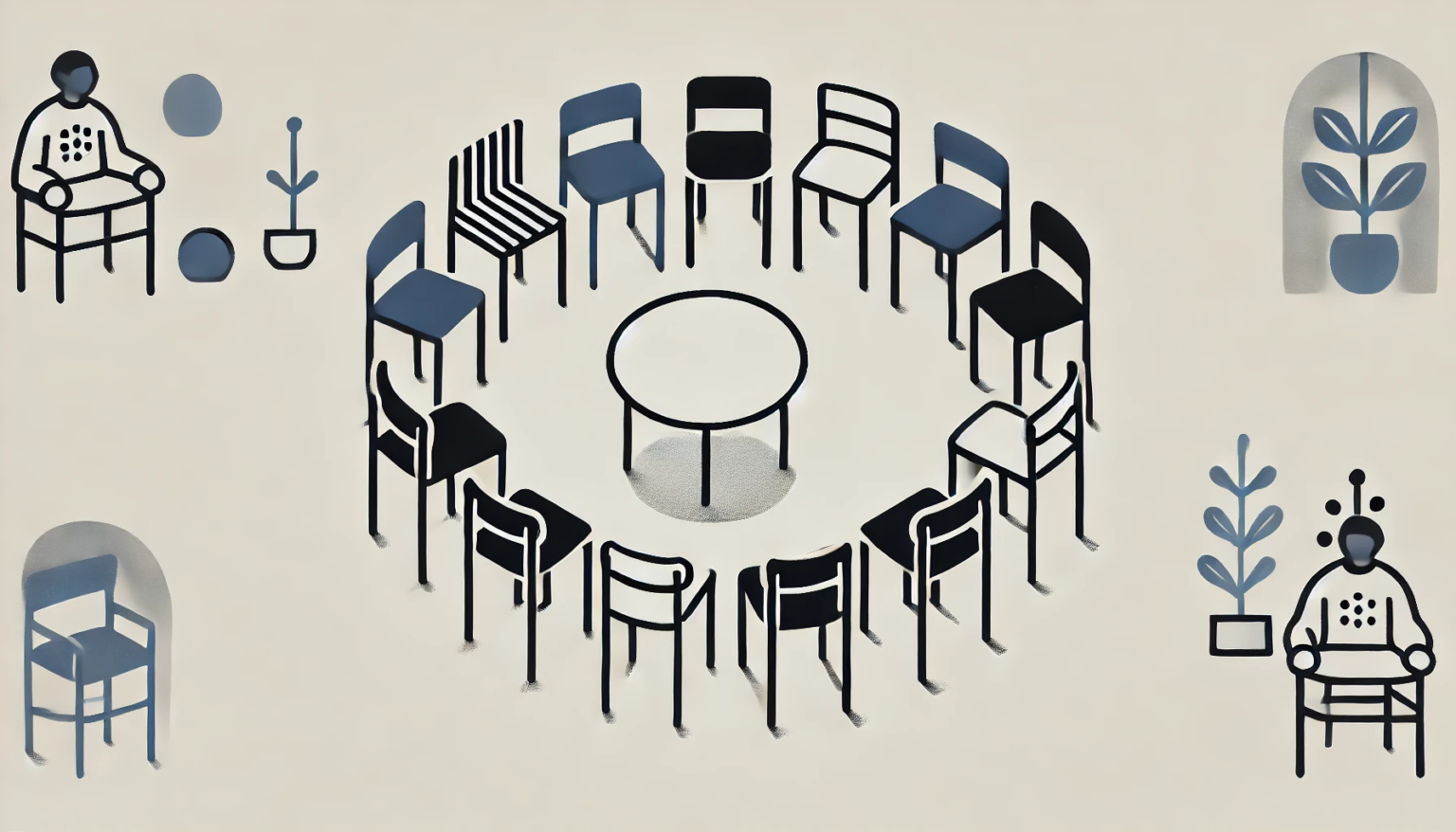THIS BLOG’S THEME: LIBERAL ADULT EDUCATION
Self-directed learning has a special role in Finnish society. Could liberal adult education, now subject to funding cuts, in the future improve the labour market position of, for example, groups at risk of exclusion? What is the link between the intrinsic value of education, and the ability to thrive at work?
In an earlier Pathfinder blog, we looked at the state of adult education in Finland via two pieces of statistics: the Adult Education Survey and staff training in companies. These statistics show that adult education both in the Helsinki Metropolitan Area, and in Finland as a whole, is doing less well compared to the rest of The Nordics (Pohjola in Finnish), comprising the Nordic Countries and Estonia (Tallinn).
At the same time, there are huge cuts in adult education in Finland, and in the spring of 2024, we received news of an increase in course fees for the Open University.
Changing skills needs and a changing working life are increasing the pressure for life-long learning and skills development among the adult population. It is therefore even more important for the labour market to recognise the range of skills and learning opportunities more widely.
This article takes a broad view of adult learning.
In terms of the future of the labour market in the Helsinki Metropolitan Area, the discussion on skills should be extended to include a debate on liberal adult education and self-directed learning.

Liberal adult education improves the quality of life
Liberal adult education is a speciality of the Nordic educational landscape, and it is offered by adult education centres, folk high schools, summer universities, sports colleges, and study centres.
What is special about liberal adult education is that it is open to all. It is based on the German concept of bildung, that is, learning. This kind of learning does not aim towards qualifications, and its content is not regulated by law.
Structured learning impacts on people’s quality of life, well-being and health, mental and physical activity, societal participation, educational and cultural attainment, and understanding of different cultures and tolerance (Jokela, Poikela, Sihvonen 2012).
The impact of structured learning, therefore, also has a significant impact on the labour market and working life. While The Ami Foundation’s focus is on skills within the workforce and the labour market, it is important to remember that education and learning do not always have to be linked to work, or to strengthening the labour market’s position.
The benefits of studying and learning new things are widely recognised, and, as such, they serve the labour market and working life. Studies have shown that participation in liberal adult education has increased participants’ self-confidence, job satisfaction, and mental and physical well-being, among other things (Manninen 2010).
Studies have also shown that participants in liberal adult education have also benefited in areas such as efficiency and performance at work, career options, and skills related to paid and voluntary work (Manninen, Teräsahde, Pätäri).
Does liberal adult education also contribute to the labour market status of jobseekers?
In Finland, the responsibility for organising employment services will be transferred from the state to the municipalities at the beginning of 2025. New services will allow for a greater variety of local models for the use of different forms of education and training.
This opens up a wide range of opportunities for municipal employment services and adult education providers, such as adult education centres, to advance the labour market status of jobseekers.
However, this may also turn into a concern, as it is far from certain that all municipalities and employment areas recognise the potential of liberal adult education as a source of cooperation, or that the providers of liberal adult education see a place for themselves in this ecosystem.
This theme is linked to the broader picture of unemployed people’s participation in education and training. Eurostat’s Labour Force Survey data show that, in recent years, unemployed people’s participation in education and training has been significantly lower in Finland than in Sweden, for example, and Finland also lags behind Denmark and Norway (Eurostat; Nordic Cooperation 2024).
Voluntary education can lower the threshold to apply for labour market training
The gateway theory can be applied to liberal adult education, as well as to the employment services reform, according to which all education can act as a gateway to other education.
Positive experiences and successes can, on the one hand, increase an unemployed jobseeker’s interest in seeking labour market training, or perhaps to further develop their skills, for example in an adult education centre, and, on the other hand, reduce the risk of exclusion.
Studies show that participation in liberal adult education increases confidence in one’s own learning ability and increases motivation to study (Manninen, Teräsahde, Pätäri).
There are many jobseekers in Finland who, for various reasons, have a high threshold for applying for labour market training, or for self-directed studies leading to a qualification, supported by unemployment benefits.
There are also groups of people who have the potential to increase or deepen their skills, but have difficulties in starting their studies.

Liberal adult education also teaches general working life skills
Finland is a degree-centred country, where studying is often seen as a one-way journey towards a diploma.
At the same time, the discussion on skills is easily reduced to technical and vocational skills. It ignores general skills needed in working life, such as problem-solving, interaction and
cooperation skills, which are learned and developed in a wide variety of ways outside the context of education leading to qualifications.
Jotpa, The Service Centre for Continuous Learning and Employment, has produced data on skills forecasting, which shows that the labour market needs not just vocational skills but also general working life skills.
In the labour markets of the future, it is therefore increasingly important to identify and recognise knowledge, skills, and competences in a broad sense, acquired in many different ways.
To quote Hannu L. T. Heikkinen and Harri Kukkonen, if we focus on narrow skills and competences, our understanding of the society narrows, which will be reflected in demands to develop simple, quick fixes to complex problems (Heikkinen, Kukkonen 2019).
Liberal adult education providers have an important role to play as teachers of civic skills. These are skills that we all need, both in our working lives and in our leisure time, regardless of our age or professional status. Organization Planner Henri Piirainen wrote an excellent article on the importance of civic skills on the Sivistystori blog in June 2024.
It is also worth noting that liberal adult education offers a wide range of language courses. The importance of language skills in the global economy is crucial, for example, for the internationalisation of Finnish companies.
Comprehensive comparative study of the Nordic countries is lacking
A survey conducted by E2 Research for the Finnish Adult Education Association shows that decision-makers do understand the importance of liberal adult education and its role in society. However, the study also highlights some risks: the concept of liberal adult education is poorly understood, and educational institutions face the need to reform both structures and attitudes towards education (E2 Research 2024).
It is therefore important that municipal decision-makers and officials responsible for education and employment recognise liberal adult education as a key part of the educational landscape, together with higher and secondary education.
As financial resources become more limited, synergies could be created through cooperation between stakeholders in the field of liberal adult education, and in the dismantling of overlapping structures. Today, distance learning enables people to take advantage of educational opportunities regardless of their location.
As a foundation, we are interested in how we can inspire, for example, young people at risk of exclusion, immigrants, and other disadvantaged groups to get excited about learning. Would this reduce exclusion, and improve their labour market position?
It would also be important to investigate how to get men more interested in learning, as studies show that liberal adult education is female-dominated (Saloheimo, Fields, Saviniemi, Manninen 2019).
A comprehensive comparative study of the state in adult education between Finland and the other Nordic countries is called for.
It would also be interesting and important to see whether we could learn from the other Nordic countries. How could we get groups, especially those with low levels of participation, more involved in learning and self-development?
Sources
· Aamulehti 25 March 2024: Avoimen yliopiston maksut nousevat tuntuvasti. (Open University fees to rise significantly.)
· Manninen Jyri: Sopeuttavaa sivistystyötä? (Adaptive education?) Aikuiskasvatus 3/2010.
· Manninen Jyri, Teräsahde Sini & Pätäri Jenni: Vapaan sivistystyön vaikuttavuus ja yhteiskunnallinen merkitys. (The impact and social significance of liberal adult education.) In Vapaa sivistystyö eilen, tänään ja huomenna. Vapaa Sivistystyö ry 2019.
· Poikela Esa: Vapaa sivistystyö sosiaalisen pääoman rakentajana. (Liberal adult education as a builder of social capital.) Aikuiskasvatus 4/2012. · E2 Research report for the Finnish Adult Education Association. Final report 30 April 2024. · Piirainen Henri: Kansalaistaidot kunniaan. (Civic skills to the fore.) Sivistystyön Vapaus ja Vastuu.
· Heikkinen Hannu L. T. & Kukkonen Harri: Ammattikorkeakoulu toisin ajateltuna. Osaaminen, Sivistys ja tiedon intressit. (University of Applied Sciences Thought Differently. Competences, Learning, and Knowledge Interests.) Aikuiskasvatus 4/2019.
· Eurostat: Participation rate in education and training.
· Nordic Co-operation. Livslångt lärande för framtidens arbetsmarknad. (Life-long learning for the labour market of the future.) TemaNord 2024:520. · The Service Centre for Continuous Learning and Employment: Osaamistarvekompassi. (Skills Compass.)
· Tomperi Tuukka & Belt Jaakko: Johdatukseksi sivistyksen ajattelemiseen. (A guide to thinking about learning.) Niin & näin 1/2019.
· Saloheimo Leena, Fields Marion, Saviniemi Suvi, Manninen Jyri: Vapaan sivistystyön opetustarjonta ja osallistujat. (Liberal adult education teaching provision and participants.) In Vapaa sivistystyö eilen, tänään ja huomenna. Vapaa Sivistystyö ry 2019.
· Jokinen Jyrki, Poikela Esa, Sihvonen Juha: Sivistyshyöty ja sosiaalinen pääoma vapaassa sivistystyössä 2012. (Educational benefits and social capital in liberal adult education 2012.)
